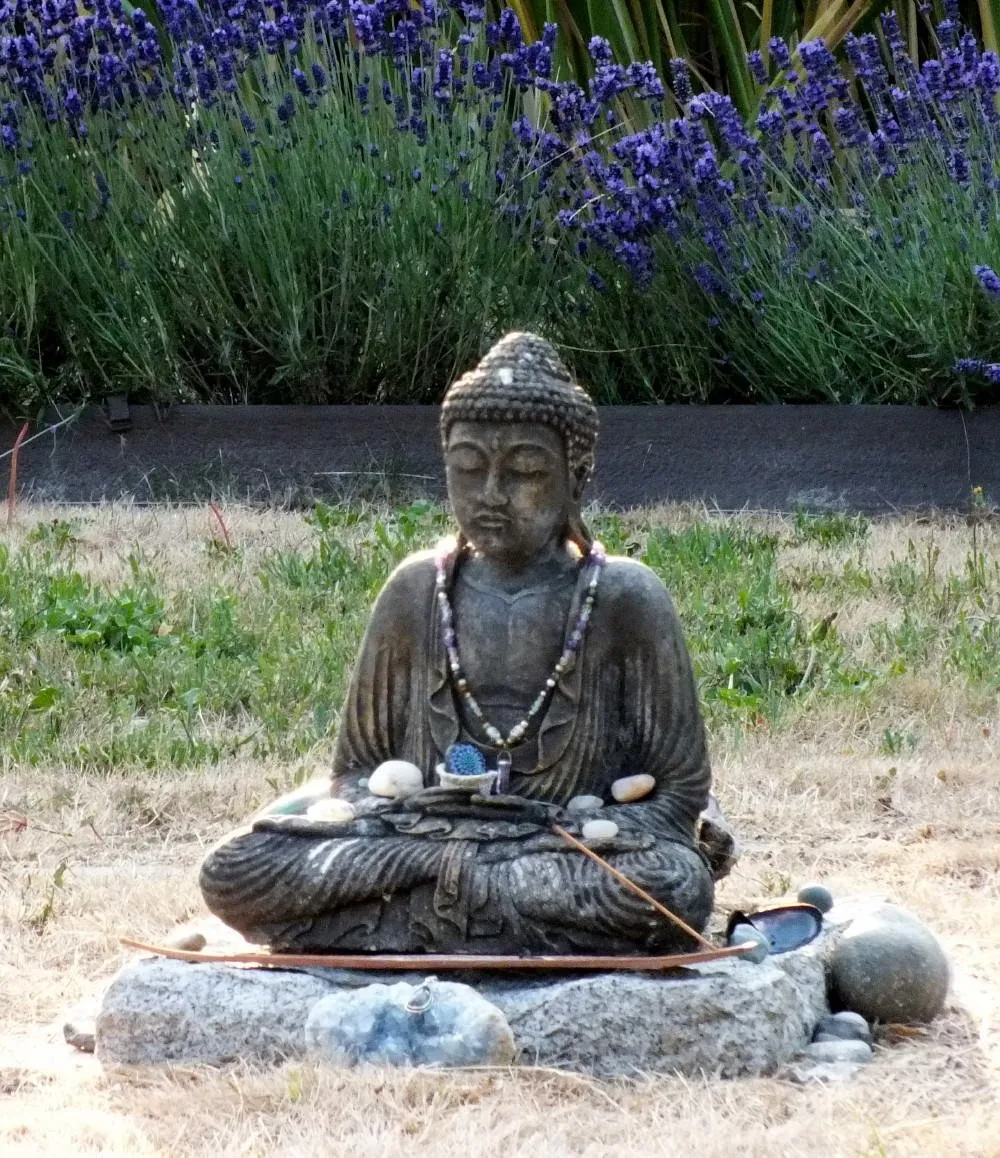Even people who are quite self-aware encounter those moments when they lapse into the old-fashioned blame game.
When I say "Blame Game," I mean those times where establishing who is right and who is wrong suddenly becomes of far greater importance than actually solving any problem we might be facing.
What is Your Objective?

Buddha in the garden
I sometimes watch Mrs. Denmarkguy and our 27-year old daughter have "heated debates" that typically end with someone storming off with hurt feelings. This, in spite of the fact that both are quite "evolved" and conscious beings, in their own way.
As a long time observer of this dynamic, so many of their struggles seem rooted in their attachment to the idea that someone MUST be "right" and someone MUST be "wrong." As the situation escalates, what unfolds becomes more a contest of debating skills than an attempt to resolve differences.
Of course, in the greater world the danger of that is that people get so wrapped up in their own stories that nothing ends up being resolved. There is not even an agreement to "agree to disagree," just hostile feelings simmering in the background.
Should I poke my nose into the situation and have the "audacity" ask something like what they were hoping to achieve, the answer might be something like "I want her to admit that I am RIGHT!"
Makes me ponder the many fights and disputes we have in the world...
83% Solutions and 9% Apologies
If you have more than even the most rudimentary grip on the realities of the world, you'll have realized that life is an imperfect place. Things are rarely going to turn out "100% your way."

Lilacs in bloom
In viewing and coming to grips with these imperfections, what many fail to consider that life's problems do not have "all or nothing" solutions, so the problem actually begins with our expectations.
Alas, our egos easily become very attached to our perceptions of a situation... and the inherent challenge-- when we make the deliberate choice to "live consciously"-- is to not allow ourselves to "put blinders on" every time our ego feels challenged by the possibility that someone else might have a good idea, and we might not be "as right" as we'd like to think.
One of the things that has helped me a lot in life is to "own my share."
That means making peace with the fact that where a compromise ends might feel like an "83% solution" to me, rather than perfect. But is arguing for that last 17% really worth it? Most likely not, so I let it go.
The "9% apology" is a different beast, that goes back to our strange need to assign blame. Life becomes a lot easier when I step up and openly accept responsibility-- and potentially apologize for-- the part of a situation for which I am accountable. Even if it's only a tiny portion... like 9%. Even if I am only a tiny bit at fault, my owning that tends to open a door for others to take ownership of their part of the problem
Compromises, Perceptions and things...
Of course, most people will argue that they are good at compromising.

Northern sunset
Alas-- on deeper examination-- many people's interpretation of compromise effectively comes closer to a "Let's discuss this... and then we do it MY way" philosophy.
If you think about it, though... when we bring a "problem" to the table, what we're really bringing is a "set of perceptions" filtered through our individual lenses of experience and in most cases the different parties to the "debate" have valid points-- from their perspective.
And so, we end up back the the question "What is TRULY your objective?" Do you want to actually find a solution to a problem, or do you merely want to "win a debate?"
Typically, the desire to "debate" is really just a cover over someone's fear that their deeper needs are not going to be met. So rather than simply argue back, maybe a better approach would be to simply ask the question "What is it you want the outcome to be, in this situation?"
Often that stops the "debating," and instead we can enter a problem solving discussion centered around what each person wants, rather than pointing out how other people are "wrong."
Don't Bring me Problems, Bring me Solutions
Many moons ago, a person I worked with-- one of my managers-- used to always tell people around him "Don't bring me problems, bring me solutions!"

Blooming lavender
The bottom line of that statement was that his office door was always open to his employees, and he was extremely forgiving and almost never found the need to "blame" anyone for their mistakes and screw-ups. However, that openness and forgiveness came with a "price," namely that he expected people to be "empowered in their own situations."
In other words... if I had an accident in the delivery truck, it would not make him angry, as long as I would show up and say "I had an accident in the delivery truck... but I called the customers and told them their shipments would be late, and the truck towed to maintenance."
Staying in a place that is "solution oriented" rather than "problem oriented" can often make discussions of differing viewpoints and opinions move much more easily.
How About You? Do you find yourself wanting to assign blame to people? Is it important to you to establish who is "right" and who is "wrong" in a situation? Are you good at compromise? Do people who have radically different viewpoints from you scare you, or get you defensive? Are you a good problem solver? Is it more important to you to find resolutions, or to win debates? In either case, WHY? And what are your objectives? Leave a comment-- share your experiences-- be part of the conversation!
 Animated banner created by @zord189
Animated banner created by @zord189
(As usual, all text and images by the author, unless otherwise credited. This is original content, created expressly for Steemit)
Created at 180117 10:45 PST